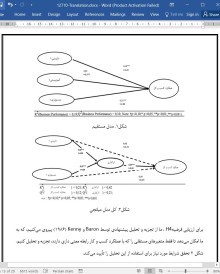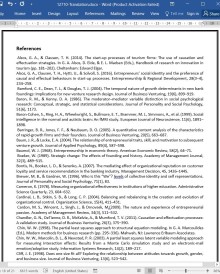
دانلود مقاله تاثیر هویت اجتماعی کارآفرین بر عملکرد کسب و کار از طریق اثر گذاری
چکیده
هویت اجتماعی مؤسس کسب و کار برای تبیین رفتار و نگرش او در تصمیمات تجاری بسیار مهم است. این مطالعه با استفاده از ترسیم سه نوع هویت اجتماعی کارآفرینی که توسط Fauchart و Gruber (2001) شناسایی شده، بررسی میکند که چگونه هویت اجتماعی بر نحوه مدیریت شرکت توسط کارآفرینان و پیامدهای آن برای عملکرد شغلی تأثیر میگذارد. نتایج نظرسنجی از شرکتهای تازه تأسیس، تأیید میکند که اثرگذاری، بستری را برای تأثیر هویتهای خاص- داروینی و میسیونری- بر عملکرد کسب و کار ایجاد میکند.
1. مقدمه
تصمیماتی که کارآفرین در سالهای ابتدایی فعالیت خود میگیرد بسیار مهم است، زیرا این تصمیمات میتوانند سیر تکاملی شرکت را محدود کنند (Boeker، 1989؛ Cardinal، Sitkin & Long 2004) و دارای پیامدهایی برای عملکرد آن هستند (Bamford، Dean، & Douglas 2004؛ Boeker، 1989؛ Park & Bae، 2004). علاوه بر این، اگرچه شیوه درک کسب و کار توسط کارآفرینان در مرحله اولیه آن، تأثیر قابل توجهی بر نتایج سطح شرکت میگذارد، اما این رابطه تا حد زیادی مورد بررسی قرار نگرفته است (Fern، Cardinal، & O’Neill، 2012). برخلاف آنچه ممکن است تصور شود، محدودیت رشد همیشه با عدم توانایی در رشد همراه نیست. این در واقع ممکن است نشاندهنده عدم تمایل کارآفرین برای پیشرفت شرکت خود باشد (Cliff 1998). برای مثال، Baum و Locke (2004) بر این باورند که اهدافی که افراد برای رشد شرکت تعیین میکنند، عوامل مهمی هستند که بر شرکتها تأثیر میگذارند. یافتههای خاص (Barringer، Jones & Neubaum 2005) حاکی از اهمیت ترکیب نگرشها و آرمانهای مختلف کارآفرینان برای توسعه تحقیقات هستند. مطالعه ما تأثیر این ارمانها را بر رشد شرکتهای تازه تأسیس بررسی میکند (Davidsson & Honig 2003). آرمانها آرزوها، اهداف یا جاه طلبیهایی هستند که فرد در حال حاضر ندارد. اینکه میخواهیم خودمان را چگونه ببینیم، یا اینکه میخواهیم شبیه چه کسی باشیم، تأثیر قابل توجهی بر رفتار ما دارد.
در مطالعات مختلف، هویت به عنوان پیش بینی کننده مهم تصمیمات و اقدامات کارآفرینان مورد تاکید قرار گرفته است (Cardon، Wincent، Singh، & Drnovsek، 2009؛ Conger، York & Wry، 2012؛ Hoang & Gimeno، 2010)، اما تنها تعداد معدودی از آنها در مورد هویت اجتماعی در زمینه کارآفرینی پاسخگو هستند. از آنجاییکه تأسیس شرکت ذاتاً یک فعالیت اجتماعی است (Whetten & Mackey، 2002)، رفتار کارآفرینان با نحوه درک خود در رابطه با دیگران شکل میگیرد (Fauchart &Gruber، 2011).
5. بحث و نتیجه گیری
این مطالعه، هویت اجتماعی بنیانگذار را به عنوان عامل موثر در استفاده از نظریه اثرگذاری و تأثیر میانجی اثرگذاری در عملکرد کسب و کار ، مورد تجزیه و تحلیل قرار داده است.
علیرغم اهمیت روزافزون هویت اجتماعی در مقالات (Stets & Bruke، 2000)، این نظریه تنها به تازگی در تحقیقات کارآفرینی استفاده شده است (Alsos و همکاران، 2016؛ Fauchart & Gruber، 2011؛ Powell & Baker،2014؛ Sieger و همکاران، 2016). اگرچه، مطالعات مختلف بر هویت به عنوان پیش بینی کننده مهم تصمیمات و اقدامات کارآفرینان تأکید میکنند (Cardon و همکاران، 2009؛ Conger و همکاران، 2012؛ Hoang & Gimeno، 2010؛ Murnieks & Mosakowski 2007؛ Navis & Glynn، 2011؛ Shepherd & Haynie 2009)، اما تنها تعداد معدودی به هویت اجتماعی در زمینه کارآفرینی پرداختهاند.
تجزیه و تحلیل ما، به خصوص بر ابتکار کسب و کار تمرکز دارد و از نظریههای تکمیلی مانند نظریه اثربخشی (Sarasvathy ، 2001) و نظریه هویت اجتماعی استفاده میکند (Tajfel، 1972؛ Tajfel & Turner، 1979).
این مطالعه کمکهای مهمی به مقالات پیشین کرده است. اولاً، ما را قادر میسازد تا تأثیر هویت اجتماعی کارآفرین را به عنوان بنیانگذار بر اهداف تجاری شرکت بررسی کنیم تا تأیید کنیم که هویت هر یک از افراد متغیر مهمی در توسعه شرکت است. همه کارآفرینان دارای دید یکسانی نسبت به شرکت نیستند و دیدگاه متمایز یک از آنها بر تصمیمات تجاری آنها تأثیر میگذارد. دوما، مطالعه ما نشان میدهد که اثرگذاری، رسانگری است که بواسطه آن هویت کارآفرین به عملکرد کسب و کار تبدیل میشود.
Abstract
The business founder's social identity is crucial to explaining his or her behaviour and attitude in business decision-making. Drawing on three types of entrepreneurial social identity identified by Fauchart and Gruber (2011), this study examines how social identities influence the entrepreneur's way of managing his/her firm and its consequences for business performance. Based on a survey of newly created firms, the results support the conclusion that effectuation channels the effects of specific identities – Darwinian and missionary – on business performance.
1. Introduction
The decisions the entrepreneur makes in the first years of activity are crucial, as they can limit the firm’s evolution (Boeker, 1989; Cardinal, Sitkin, & Long, 2004) and have implications for its performance (Bamford, Dean, & Douglas, 2004; Boeker, 1989; Park & Bae, 2004). Further, although entrepreneurs’ way of understanding the business in its initial stage impacts firm-level results significantly, this relationship received little study (Fern, Cardinal, & O’Neill, 2012). Contrary to what one might think, limited growth is not always associated with inability to grow; it may actually reflect the entrepreneur’s lack of desire to grow his/her firm (Cliff, 1998). For example, Baum and Locke (2004) propose that the goals businesspeople establish for firm growth are significantfactors that influence the firms. Specific findings (Barringer, Jones, & Neubaum, 2005) suggest the importance of incorporating entrepreneurs’ different attitudes and aspirations for growth in research. Our study examines the impact of these aspirations on the growth of newly created firms (Davidsson & Honig, 2003). Aspirations are desires, goals, or ambitions—something desired thatthe individual does not possess at the moment. How we want to see ourselves, or whom we wish to resemble, strongly influences our behaviour.
Various studies highlight identity as an important predictor of entrepreneurs’ decisions and actions (Cardon, Wincent, Singh, & Drnovsek, 2009; Conger, York, & Wry, 2012; Hoang & Gimeno, 2010), but only a few tackle social identity in the context of entrepreneurship. Since firm creation is an inherently social activity (Whetten & Mackey, 2002), entrepreneurs’ behaviour is shaped by how they perceive themselves in relation to others (Fauchart & Gruber, 2011).
Alsos, Clausen, Hytti, and Solvoll (2016) argue that a key aspect of entrepreneurship research studies the activities and behaviours undertaken (Davidsson & Honig, 2003). Itis precisely Social Identity Theory that helps us to understand and explain the heterogeneous behaviours that founders pursue in the process of setting up a firm. Although different patterns exist, these authors stress effectuation and causation as two different focuses for new firm creation (Sarasvathy, 2001)—focuses described as one ofthe mostimportant contemporary perspectives in entrepreneurship research (Fisher, 2012; Perry, Chandler, & Markova, 2012).
5. Discussion and conclusions
This study analyses both the founder’s social identity as a factor that influences use of effectuation and the mediating effect of effectuation in business performance.
In spite of the increasing importance of social identity in the literature (Stets & Bruke, 2000), this theory has only been applied relatively recently to entrepreneurship research (Alsos et al., 2016; Fauchart & Gruber, 2011; Powell & Baker, 2014; Sieger et al., 2016). Although various studies stress identity as an important predictor of entrepreneurs’ decisions and actions (Cardon et al., 2009; Conger et al., 2012; Hoang & Gimeno, 2010; Murnieks & Mosakowski, 2007; Navis & Glynn, 2011; Shepherd & Haynie, 2009), only a few tackle social identity in the context of entrepreneurship.
Our analysis focuses specifically on the business initiative, employing complementary theories that support this field, such as Effectuation Theory (Sarasvathy, 2001) and Social Identity Theory (Tajfel, 1972; Tajfel & Turner, 1979).
This study makes several fundamental contributions to the prior literature. First, it enables us to examine the influence of the entrepreneur’s social identity as founder on the firm’s business objectives and goals, confirming that each individual’s identity is an important variable in the firm’s development. Not all entrepreneurs possess the same view of the firm, and each one’s distinctive vision affects their business decisions. Second, our study suggests that effectuation is the vehicle by which the entrepreneur’s identity translates into business performance.
H1. Darwinian identity has a positive effect on business performance.
H2. Communitarian identity has a positive effect on business performance.
H3. Missionary identity has a positive effect on business performance.
H4. Effectuation has a positive total mediating effect on the relationship between the entrepreneur’s social identity and business performance.
H1. هویت داروینی تأثیر مثبتی بر عملکرد کسب و کار دارد.
H2. هویت کمونیستی تأثیر مثبتی بر عملکرد تجاری دارد.
H3. هویت میسیونری تأثیر مثبتی بر عملکرد کسب و کار دارد.
H4. اثرگذاری دارای اثر تعدیل کننده مثبتی بر رابطه بین هویت اجتماعی کاربر و عملکرد کسب و کار است.
چکیده
1. مقدمه
2. فرضیات
3. روش شناسی
3.1. ارزیابی متغیرهای مطالعه
3.1.1. عملکرد کسب و کار
3.1.2 هویت اجتماعی
3.1.3 اثرگذاری
4 تجزیه و تحلیل و نتایج
4.1 همبستگی بین متغیرهای تحلیل شده (جدول 1)
4.2 تجزیه و تحلیل متغیرهای مدل اندازه گیری (جدول 2)
4.3 وزن دهی سازههای مرتبه دوم (جدول 3)
4.3.1 وزن دهی متغیرهای تکوینی (جدول4)
4.3.2 مدل مستقیم (شکل1)
4.3.3 کل مدل میانجی (شکل2)
5. بحث و نتیجه گیری
منابع
ABSTRACT
1. Introduction
2. Hypotheses
3. Methodology
3.1. Measurement of the study variables
3.1.1. Business performance
3.1.2. Social identity
3.1.3. Effectuation
4. Analysis and results
4.1. Correlation among the variables analysed (Table 1)
4.2. Analysis of measurement model variables (Table 2)
4.3. Weightings of second-order constructs (Table 3)
4.3.1. Weightings of formative variables (Table 4)
4.3.2. Direct model (Fig. 1)
4.3.3. Total mediation model (Fig. 2)
5. Discussion and conclusions
References
- اصل مقاله انگلیسی با فرمت ورد (word) با قابلیت ویرایش
- ترجمه فارسی مقاله با فرمت ورد (word) با قابلیت ویرایش، بدون آرم سایت ای ترجمه
- ترجمه فارسی مقاله با فرمت pdf، بدون آرم سایت ای ترجمه



